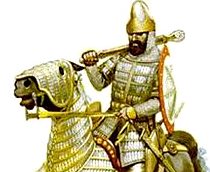
Battle of Maranga |
year: 36322 June 363 |
| A victory of the Romans under emperor Julian on their way out of Persia | ★ ★ ★ ★ ★ |
|
enemy: Sassanid Persians
|
location: Between Ctesiphon and Samarra, in Iraq
|
accuracy:
●●●●●
|
|
battle type: Pitched Battle |
war: Later Roman-Persian Wars |
modern country:
Iraq |
| ▼ The Byzantines(emperor: Julian the Apostate) | ▼ The Enemies | |
| Commander: | Emperor Julian | Merena |
| Forces: | 65,000 | Unknown |
| Losses: | Light | Heavy |
| Background story: |
| After the victorious battle of Ctesiphon, Emperor Julian had to retreat realizing that Ctesiphon was too strongly defended to be taken while his army was running out of supplies. So decision was taken to retreat to the north. The Sassanid army implemented a scorched earth policy while harassing Romans all their way back to Roman Mesopotamia. |
The Battle: |
 Sassanid cataphract The Sassanid army lined up with cataphracts in the center and clibanarii armed with both lance and bow on the wings. The elephants were placed to the rear along with the bowmen and levies. Julian formed his army in a crescent formation with the wings pointed toward the Persians, and advanced rapidly to avoid a prolonged missile contest. After hard, drawn-out fighting, the Romans pushed back the Sassanids. Having suffered heavy casualties, the Persians retired in some disorder, covered by the bows of their cavalry. The Romans suffered only light losses. |
Noteworthy: |
| Something that is not particularly noted by historians, but certainly played an important role in the decision to return: in those places, in May and June it never rains, the daytime temperature is close to 40° Celsius and the humidity is 100%. If we add to these nightmarish conditions the lack of supply, the constant enemy attacks and the ground that had been turned into a swamp, it is not surprising that the Romans, unprepared for such conditions, decided to retreat. |
Aftermath: |
| The Persians had been repulsed and Julian’s retreat could now continue. But the losses were significant and the conditions difficult, and now any further delay in the retreat contributed to the continued weakening of the army, whose supplies had reached a tipping point. |
|
|
